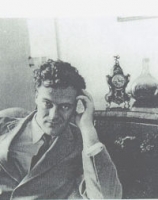Read works of Robert Lowell at 诗海 | |||
He was born in Boston, Massachusetts to a Boston Brahmin family that included the poets Amy Lowell and James Russell Lowell. His mother, Charlotte Winslow, was a direct descendant of William Samuel Johnson, a signer of the United States Constitution, Jonathan Edwards, the famed philosopher, Anne Hutchinson, the Puritan preacher and healer, Robert Livingston the Elder, Thomas Dudley, the second governor of Massachusetts, and Mayflower passengers James Chilton and his daughter Mary Chilton. He was at St. Mark's School, a prominent prep-school in Southborough, Mass, before attending Harvard College for two years and transferring to Kenyon College in Gambier, Ohio, to study under John Crowe Ransom.[1] He converted from Episcopalianism to Catholicism,[2] which influenced his first two books, Land of Unlikeness (1944) and the Pulitzer Prize winning Lord Weary's Castle (1946). In 1950, Lowell was included in the influential anthology Mid-Century American Poets as one of the key literary figures of his generation. Among his contemporaries who also appeared in that book were Muriel Rukeyser, Karl Shapiro, Elizabeth Bishop, Theodore Roethke, Randall Jarrell, and John Ciardi, all poets who came into prominence in the 1940s.
Lowell was a conscientious objector during World War II and served several months at the federal prison in Danbury, Connecticut. During the 1960s he was active in the civil rights movement and opposed the US involvement in Vietnam. His participation in the October 1967 peace march in Washington, DC, and his subsequent arrest are described in the early sections of Norman Mailer's The Armies of the Night.
Lowell suffered with alcoholism and manic depression and was hospitalized many times throughout his life. He was married to novelist Jean Stafford from 1940 to 1948. In 1949 he married the writer Elizabeth Hardwick. In 1970 he left Elizabeth Hardwick for the British author Lady Caroline Blackwood. He spent many of his last years in England. Lowell died in 1977, having suffered a heart attack in a cab in New York City on his way to see Elizabeth Hardwick. He is buried in Stark Cemetery, Dunbarton, New Hampshire.
Lowell's collected poems were published in 2003 and his letters in 2005, leading to a renewed interest in his work.
Writing
He reached wide acclaim for his 1946 book, Lord Weary's Castle, which included ten poems slightly revised from his earlier Land of Unlikeness, and thirty new poems. Among the better known poems in the volume are "Mr Edwards and the Spider" and "The Quaker Graveyard in Nantucket." Lord Weary's Castle was awarded the Pulitzer Prize in 1947. Lowell's early poems are formal, ornate, and concerned with violence and theology; a typical example is the close of "The Quaker Graveyard" -- "You could cut the brackish winds with a knife / Here in Nantucket and cast up the time / When the Lord God formed man from the sea's slime / And breathed into his face the breath of life, / And the blue-lung'd combers lumbered to the kill. / The Lord survives the rainbow of His will."
The Mills of the Kavanaughs (1951) did not receive similar acclaim, but Lowell was able to revive his reputation with Life Studies (1959). The poems in this book were written in a mix of free and metered verse, with much more informal language than he used in his first two books. It marked both a big turning point in Lowell's career, and a turning point for American poetry in general. Because many of the poems documented details from Lowell's family life and personal problems, one critic, M.L. Rosenthal, labeled the book "confessional." For better or worse, this label stuck. Lowell's editor and friend Frank Bidart notes in his afterword to Lowell's Collected Poems, "Lowell is widely, perhaps indelibly associated with the term 'confessional,'" though Bidart questions the accuracy of this label.[3]
Lowell followed Life Studies with Imitations, a volume of loose translations of poems by classical and modern European poets, including Rilke, Montale, Baudelaire, Pasternak, and Rimbaud, for which he received the 1962 Bollingen Poetry Translation Prize.
His next book For the Union Dead, 1964, was also widely praised, particularly for its title poem, which invokes Allen Tate's "Ode to the Confederate Dead." In Near the Ocean, which followed a couple of years later, Lowell had returned to stanzaic forms. The best known poem in this volume, "Waking Early Sunday Morning," is written in eight-line stanzas borrowed from Andrew Marvell's poem "Upon Appleton House."
During 1967 and 1968 he experimented with a verse journal, published as Notebook, 1967-68. These fourteen-line poems loosely based on the sonnet form were reworked into three volumes. History deals with public history from antiquity onwards, and with modern poets Lowell had known; For Lizzie and Harriet describes the breakdown of his second marriage; and The Dolphin, which won the 1974 Pulitzer Prize, includes poems about his marriage to Caroline Blackwood and their life in England.
A minor controversy erupted when he incorporated private letters from his second wife, Elizabeth Hardwick into For Lizzie and Harriet. He was particularly criticized for this by his friends Adrienne Rich and Elizabeth Bishop.
Works
Land of Unlikeness (1944)
Lord Weary's Castle (1946)
The Mills of The Kavanaughs (1951)
Life Studies (1959)
Phaedra (translation) (1961)
Imitations (1961)
For the Union Dead (1964)
The Old Glory (1965)
Near the Ocean (1967)
The Voyage & other versions of poems of Baudelaire (1969)
Prometheus Bound (1969)
Notebook (1969) (Revised and Expanded Edition, 1970)
For Lizzie and Harriet (1973)
History (1973)
The Dolphin (1973)
__Select__ed Poems (1976) (Revised Edition, 1977)
Day by Day (1977)
The Oresteia of Aeschylus (1978)
Collected Poems (2003)
__Select__ed Poems (2006) (Expanded Edition)
Edited by: hello
